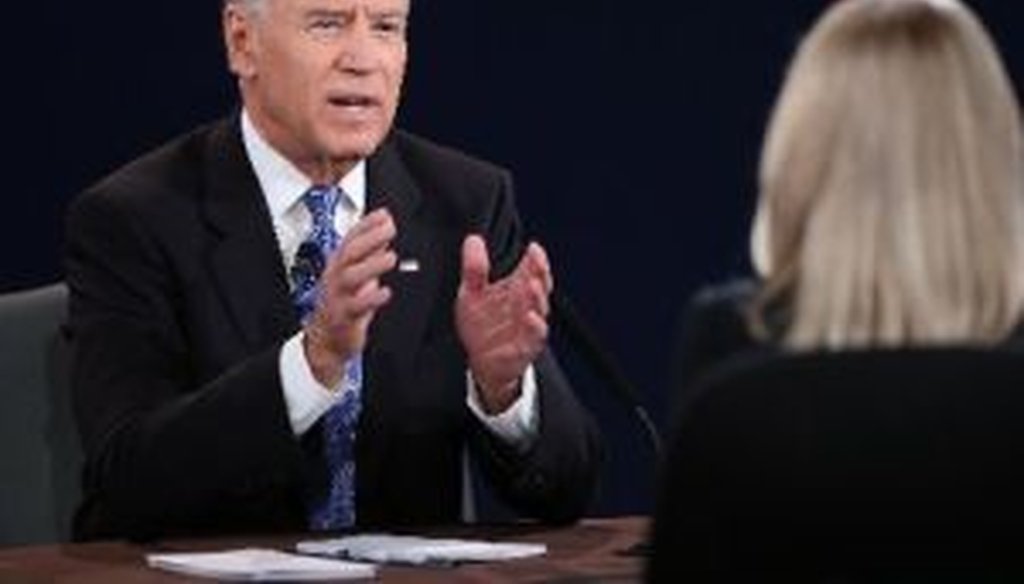

Our only agenda is to publish the truth so you can be an informed participant in democracy.
We need your help.


Vice President Joe Biden makes his case to debate moderator Martha Raddatz of ABC News.
In the vice presidential debate in Danville, Ky., Joe Biden and Paul Ryan sparred over embassy security in the wake of the deadly attack on the U.S. consulate in Benghazi.
"This lecture on embassy security — the congressman here cut embassy security in his budget by $300 million below what we asked for," Biden said.
When we checked with the Obama campaign, a spokeswoman said that the claim of a $300 million cut can be supported in either of two ways.
One -- which was noted by several fact-checkers in the aftermath of the debate -- is that Ryan, as the chairman of the House Budget Committee, put forward such severe cuts in his budget proposal that, running the numbers, embassy security funding would suffer a cut of $300 million.
The second was was to compare the relevant budget lines in the president’s proposed fiscal year 2012 budget to the amount passed by the House of Representatives last year.
We’ll look at both of these justifications, but first, let’s outline what Obama proposed for fiscal year 2012 (figures are rounded):
Worldwide Security Protection (ongoing operations): $1.45 billion
Worldwide Security Protection (overseas contingency operations): $247 million
Embassy Security, Construction, and Maintenance -- Worldwide Security Upgrades: $938 million
Total: $2.64 billion
Cuts from Ryan’s proposed budget
The Obama administration’s Office of Management and Budget has run the numbers in the Ryan budget and argues that it will cut non-defense discretionary spending as a whole by 19 percent between 2013 and 2014. A 19 percent cut to a $2.64 billion line item works out to just over $500 million -- even more than the number Biden cited.
Leaving aside whether this percentage is accurate, using it in this context is problematic. First, it’s not an immediate cut -- according to OMB, the 19 percent cut would happen in the second year of Ryan’s budget, with the first year representing a 5 percent cut.
More importantly, as the Romney-Ryan campaign noted in an interview -- and as we have written in the past -- all of this is a speculative proposition. Ryan’s budget did not reduce federal expenditures across the board, and assuming that every item under Ryan’s budget would be cut equally isn’t the most accurate way to look at it. (That said, the lack of detail in Ryan’s plan has left the Romney-Ryan ticket open to such attacks.)
Cuts in spending already passed by Congress
Using the second justification -- comparing Obama’s request to what the GOP-controlled House voted to spend for fiscal year 2012 -- has the advantage of not being speculative. Here’s the amount passed by the House for fiscal 2012 (figures also rounded):
Worldwide Security Protection (ongoing operations): $1.31 billion
Worldwide Security Protection (overseas contigency operations): $247 million
Embassy Security, Construction, and Maintenance -- Worldwide Security Upgrades: $755 million
Total: $2.31 billion
The difference between these two amounts is nearly $327 million -- a bit above the $300 million Biden cited.
Ultimately, a final bill with slightly higher amounts than the House’s initial bill -- about $60 million more -- was passed by both chambers and signed by the president.
But this approach has problems as well. For starters, Biden glosses over the fact that the president did ultimately sign the bill with the new lower funding amount, meaning he shares some responsibility for the lower level. (All presidential budget requests are opening offers that inevitably become subject to negotiation.)
The main problem with Biden’s claim, however, is that it’s not really what he was referring to in his claim from the debate. Biden said Ryan "cut embassy security in his budget by $300 million below what we asked for," but what passed the House wasn’t Ryan’s budget blueprint -- it was an actual spending bill that emerged from the House Appropriations Committee.
This may be a distinction of interest only to budget wonks, but by muddying the difference, Biden is able to hold up Ryan’s budget -- a long-standing target of Democratic attacks for its approach to Medicare and other federal programs -- as the perpetrator of the cuts, rather than the more obscure appropriations bill.
Our ruling
Both ways of defending the claim of a $300 million cut have some justification, but also come with problems. Extrapolating from Ryan’s budget is a speculative exercise, while the enacted appropriations figures were not directly shaped by Ryan's budget. On balance, we rate the claim Half True.
Joe Biden, transcript of the vice presidential debate in Danville, Ky., Oct. 11, 2012
State Department, Congressional Budget Justification, Volume 1: Department of State Operations, Fiscal Year 2012
House Budget Committee, "Path to Prosperity: Fiscal Year 2012 Budget Resolution"
House Oversight and Government Reform Committee Democratic staff, memo on a hearing on "The Security Failures of Benghazi," Oct. 9, 2012
U.S. House of Representatives, "Making appropriations for the Department of State, foreign operations, and related programs for the fiscal year ending September 30, 2012, and for other purposes," July 26, 2011
Office of Management and Budget: "The Ryan-Republican Budget: The Consequences of Imbalance," March 21, 2012
PolitiFact, "President Barack Obama says GOP budget cuts financial aid to college students," April 6, 2012
Interview with Steve Ellis, vice president of Taxpayers for Common Sense, Oct. 15, 2012
In a world of wild talk and fake news, help us stand up for the facts.
